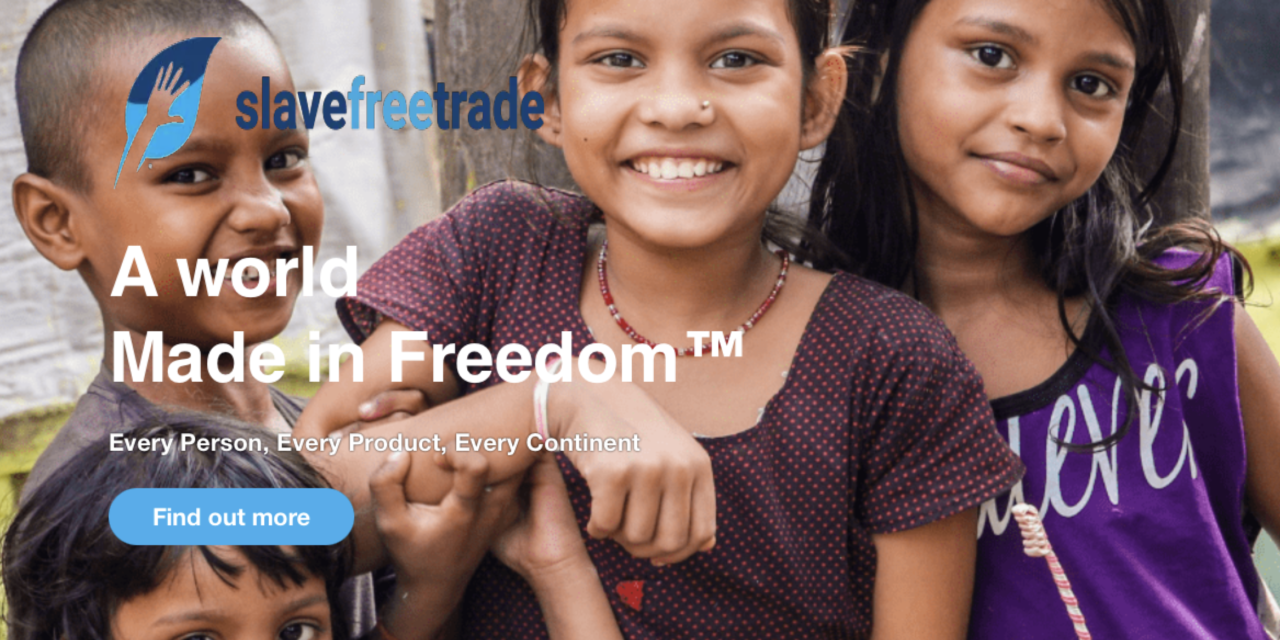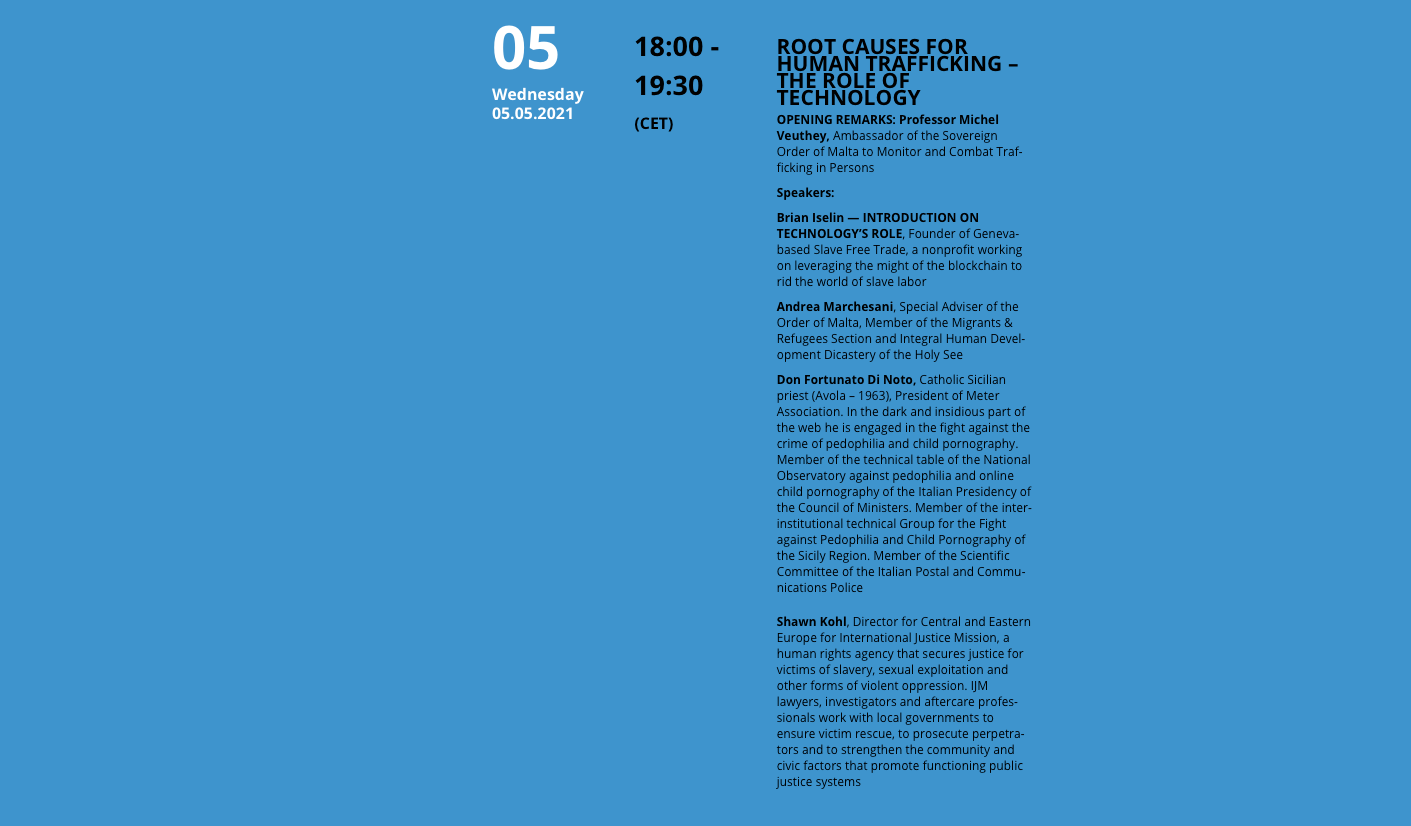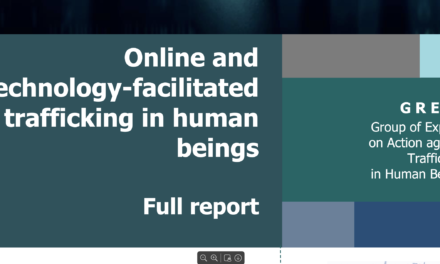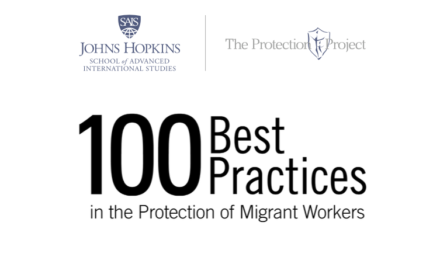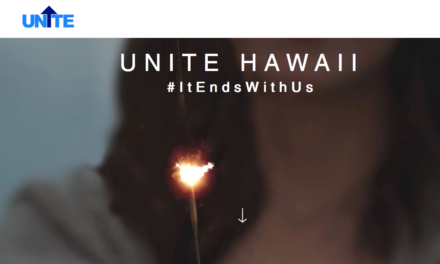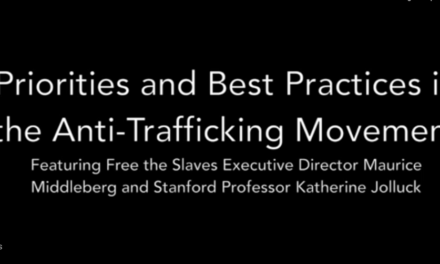BRIAN ISELIN: Welcome, everybody to this presentation on the role of technology in addressing demand in human trafficking.
I want to kick off this session with a plea for some clarity and use my time, I hope wisely, to address something I’d noticed before, but which really came into specific relief while researching for this webinar: while looking for evidence of impact, outcomes, and sustainability data from the major tech against trafficking projects, I actually found none, universally!
What I did find, however, was how so many projects they claim to be contributing to ending, eliminating or eradicating trafficking. Now the terms that are used to describe actions being taken for the most part are frankly a little bit hysterical: you find, “eliminate”, “fight and eradicate”, “tackle”, “war against”. It’s all tough talk and I think it’s, very political.
But what does it mean? A quick scan of initiatives, especially in the tech world at the terms used, just shows to me that there’s very little thought about the meaning and impact of those words beyond some kind of sensationalism. Now, my plea is that before using these terms to describe an initiative, I would ask people to consider the realistic impact a single initiative can lay claim to… And is the claim accurate or hyperbole?
Now, if you’re working to support victims of trafficking, you’re not ending, eradicating or eliminating modern slavery. You’re helping victims, you’re cleaning up and you’re undoubtedly doing good, but you’re not ending, eradicating or eliminating. If you’re doing anything on the supply side, in fact, like rescues, identifying victims, police or intelligence operations, poverty reduction, you’re not ending or eliminating modern slavery. You are at best addressing vulnerabilities and cleaning up. You may even be confronting it or attacking it if that language is exciting for you, but you aren’t ending it, eradicating or eliminating.
If you’re working on reducing demand for a form of human trafficking, you may honestly say you are working to end, or eliminate, or eradicate, but it’s only on the demand side. Which is why doing research on the demand side is so important.
Let me be clear! There is not a single supply-side measure that can ever hope to end, eliminate or eradicate. If you work on the supply side, just stop using that language. It’s hyperbole. The reason I raise it is actually bigger than the fact that it’s hyperbole, the fact that it’s sloppy and sensationalist. It’s confusing to consumers. It’s confusing to donors. It’s confusing especially to policymakers, and crucially, what we end up with is funds that should be used to ending, eliminating or eradicating modern slavery, being used to clean up or to address vulnerabilities. It’s behavior that distorts policy and priorities. And overall, I think it leads to a global lack of impact.
So now that I’ve got that off my chest, I’d like to be able to talk about one of the only demand-side tech projects out there. I don’t know whether you know the phrase, the Latin phrase, “Esse Quam Videri”. “To be, not to seem”. Now, this is the motto of “Slavefreetrade”, a Swiss nonprofit association I formed at the end of 2018. The meaning of this motto is at the heart of the initiative.
I’ve been working decades on slavery operations in supply chains, and largely I found that businesses are content with seeming to be doing something, not actually doing something. And by and large, stakeholders, including consumers, procurement agencies, shareholders and investors are content with the “seeming”.
I’m happy to report, I think, that this has changed. The world is now kind of abuzz with initiatives in the business, UN, and nonprofit world, to come to terms with an increasingly engaged, maybe we could even say sometimes agitated community of stakeholders interested in human rights performance and risk in business. We’re seeing shareholder revolts over serial sexual harassment. We’re seeing child labor scandals in major clothing brands and the promotion of sustainability professionals into key leadership roles in companies. Human rights are suddenly coming into focus a bit more. It would be going too far to say there is momentum, but perhaps we can agree that there is at least the movement.
And this movement coincides with significant legislative movement in that direction from the Modern Slavery Act slipping the Anglophone world, to human rights due diligence models in the Francophone and the European world. Now taking a step back to take in the view, the corporate world, which was formerly content to use its blend of structural, instrumental, let’s say, discursive power to hold back the forces of change in their business model, are finding that position less tenable. Clever businesses, those with an eye on the emerging world, are exploring what that wave of change means to them and what they need to do to ride it.
How does a business be and not just seem to be interested in human rights in workplaces? The first step as Socrates said, to wisdom, is to know thyself.
Now, if you’re interested in human rights in workplaces, it can’t be only about them and over there. That’s called othering. And it’s the very core of the belief that we’re better than everyone else. And it also is the foundation that we think we are beyond reproach. If you genuinely care about human rights in workplaces, start at home. Human rights issues don’t just happen over there. Witness the MeToo Movement, and the BLM Movement.
So let’s start with some background on the actual problem we’re addressing here. Universally, we condemn modern slavery and we’ve talked about this in past webinars and we prohibit it, and yet we all buy it. We touch modern slavery every day more often than we actually touch our faces. And thanks to Covid, we’ve become very aware of how much we touch our faces every day.
Slavery, encompassing the illegal conditions of child labor, human trafficking, forced labor, slavery and servitude, is now more prevalent than at any time in history and we’ve heard these numbers over the past few weeks: 77% of UK businesses when given anonymity, admit modern slavery exists in their business.
Historically, we are used to modern slavery being addressed as a form of organised crime. Well, historically, since the year 2000… But that conceptualization is far from actually accurate.
The vast majority of the world’s human rights issues in workplaces, forced labor, child labor, slavery and servitude have little or nothing to do with organized crime.
And law enforcement, in fact, can never solve modern slavery anyway. So law enforcement or crime-focused approach is not the solution.
Modern slavery is actually best understood as that kind of bad, eroded end of a spectrum of human rights in workplaces. The spectrum being from modern slavery to decent work. Now, if you can objectively prove a workplace is at the decent-work end of the spectrum, modern slavery will not be present. You cannot be at opposite ends of the same spectrum at the same time. So if we can automate and scale rigorous real-time processes to understand exactly what’s happening in a workplace, we can determine whether they are at the decent work end or the modern slavery end.
So we can do this through assessing and monitoring conditions in real time. And what I propose, what I am developing, is a carefully selected set of 100 indicators derived exclusively from international human rights law. So for this exercise, picture, a long row of 100 escalators in a mall running off into the distance. At the foot of these escalators is the murky swamp of modern slavery. At the top of the escalators is this world of decent work. Now, what if I told you, you could know at all times which step you are on for each of those 100 escalators, and whether you’re moving up or down? Well, that’s the project Slavefreetrade.
So we’re a Swiss nonprofit association, and what we want to do is foment a new global economy exclusively for goods and services proved to have been made without harming anyone, and we do that through harnessing demand. We envision a world in which an investor can scroll through the New York Stock Exchange Connect App, and see exactly which companies are human rights friendly and risk-free. In that same world, a millennial looking at a job in Glasdoor can readily identify a human rights-friendly employer. A shopper looking at prawns or chocolate in a supermarket can know which ones have not harmed anyone in the making. A procurement agency, the Ministry of Defense, evaluating bids for army boots, can see at a glance the human rights performance of the maker.
This is harnessing demand. “Libertas”, it’s a rights-tech project of slavfreetrade. It’s the use of technology to extend, expand and promote human rights. It’s an initiative designed to provide the scalable tools for the mission of that new economy. It’s a technical term. It’s a distributed human rights intelligence system.
It’s designed specifically to drive demand for human rights-friendly workplaces globally. It harnesses the compelling power of primary source data from workplaces, that’s individual views and organizational perspectives alike. It analyzes and distributes the resulting decision intelligence to those whose buying and business decisions can be influenced by that data.
Our approach is not to prove modern slavery exists in workplaces. That’s what I’ve been doing the last 20 years, and it’s completely unscalable. But actually, our approach is to prove modern slavery doesn’t exist in workplaces!
And that sounds like such an easy flip, right? But this is actually a watershed moment.
This shift signals a move from a treatment model to a vaccination model.
Instead of treating each case after it’s happened, we prove and create a culture of respect for human rights in a workplace, ushering in a world of workplaces that are impervious, vaccinated, against modern slavery. So Slavefreetrade is an initiative designed with system seeking to overcome and avoid many of the problematic issues and concerns around all existing methods. So up until now, human rights defied quantification. So “Libertas” quantifies human rights, which means we’re able to monitor, assess and compare in a way that’s completely agnostic to product, geography, industry, socioeconomic conditions.
Existing responses like rescues and audits, and investigations like I’ve been doing, cannot scale. They’re labor-intensive, they’re expensive. So “Libertas” is designed to be scalable, remote, cheap, global coverage, and takes out intermediaries from the system where failure often comes.
Current models, most of you who know about audit will support me on this, are easily defeated and defrauded. Fraud, false statements, coercion, collusion, greenwashing are commonplace, and the “Libertas” model counters all of those conditions.
I think most of you would also believe and understand that staff are largely ignored or voiceless in the majority of existing initiatives. There is no comprehensive canvassing of views of workers in BCorp, Fairtrade, Global Reporting Initiative, sustainability initiatives like EcoVadis and Sustainalytics and so on, they can’t universally canvass workplaces. And so the staff are ignored or voiceless. You’re pretty much capturing only the corporate view. So “Libertas” amplifies the voices of those in workplaces in support of their own conditions and in support of the improvement of those conditions.
Now, up until now, power and commodity chains has been very unbalanced and very unfair. So “Libertas” has a democratizing effect. The staff working in the global value and commodity chains are the overwhelming majority of people in those chains. Their voices do matter, but they’re not being canvassed until now. Now, supply chains are disaggregated, complex, globalized, opaque. These are the sorts of words we tend to hear about supply chains. So “Libertas” converts opaque chains, disaggregated networks, to collaborative networks, by making each establishment in a business network dependent on the human rights performance of the others.
So suddenly a three-tier supply chain, each of the partners, each of the companies in that chain become partners. They understand each other’s human rights conditions. They are much more visible and much more transparent than ever before, and they actually start to become interested in each other’s human rights interests. So human rights have been treated previously as separate from the normal conduct of business, and they’ve been put off in CSR, or ESG, or sustainability initiatives. So “Libertas” embeds human rights into the bottom line.
In-person audits or investigations, especially on sensitive topics like human rights, don’t get the best answers. “Libertas” generates trust because the entire system is built on anonymity and confidentiality. Importantly for the demand side initiatives, stakeholders like consumers, procurers, investors, they have not had tangible actions that express their values through buying decisions. So “Libertas” informs them with timely, actionable decision intelligence, including consumers at point of sale, procurers at point of bid, and investors at point of investment.
Existing measures like rescue, surveillance, audit, law enforcement investigations, as I’ve said before, these are labor-intensive and expensive and you can’t scale them. If we’re going to eliminate 152 million children from child labor, if we’re going to address that properly, we’ve got to have a solution that can scale almost infinitely. Most measures on socially sustainable business are top-down. This makes it look and feel to workers like fundamental human rights are actually alienable, not inalienable, and something that should be bestowed on them by the employer.
And Slavefreetrade, however, is human-centric and inclusive. It’s really important that people in workplaces realize their rights are not something that the employer can take away from them. Putting the emphasis on remote data collection and analysis doesn’t eliminate the need for human intervention. But remote monitoring like this becomes the new, more comprehensive and more effective default.
And so this change ushers in a scalable default only limited by two things actually, goodwill and data storage.
Certification schemes are also very expensive for small businesses. Many smallholders can’t join. The membership exceeds their ability to pay. In the slavefreetrade model, smallholders are free. Implementation costs are negligible.
There’s no hardware or setup costs. “Libertas” runs in a simple browser, mobile application, or with API integrations for different audiences. If you could hypothetically scale to the global audit work force required, if we wanted to make audit the real effective default, the cost to match what we can do would easily be many millions and potentially even billions of dollars a year compared to in our system, a mere few thousand. So no existing model has had that level of lack of expense let’s say, to make it possible to do these things on a scale. And no existing model has a universal international human rights law framework.
This makes it the first deployable definition for decent work. It’s agnostic to geography, good, service, product, jurisdiction, language, power. I mean, it doesn’t matter what Bangladesh says are living wages. We’re talking about harnessing the views of the people in the workplace about their lived experience. The first piece of our project to capture consumer demand, and I’m winding up here, and feed that through to businesses to join and become human rights compliant is what we call the Freedomer App: so this is a smartphone application which has two phases.
We’ve currently designed and we are currently crowdfunding the coding of phase one. Now, phase one of this App is a demand aggregator. So at the moment, businesses say their customers don’t care, which is actually crap. The fact is consumers, let’s talk just you and I for a start, we care. What we don’t have is a reliable way to tell them that we care, and we don’t have a way to join our voices with others to say that we all care. So the Freedomer App does this. A campaigning App, you put in products that you want to be slave-free, like Levi’s 502’s, and others are then invited to join your campaign. When we have sufficient signatures to make an appeal to a brand, we do it on behalf of the, let’s say, thousands of signatories in the App. The thing is that you care, I care, lots of people care, but our voices are not joined up. So the Freedomer App is the first time a tool has been developed to do that. Help us bring the Freedomer App into your hands, and then we can all harness the power of our own demands for a collective good.
So, I ask you to go to wemakeit.com and look for slavefreetrade’s crowdfund. There’s just seven days to go, I think we’re on 79% or something like that. So the point there is that you can be the difference, you can actually take a part right now, as soon as we deliver it, you can take a part every day in providing a growing demand for the end of trafficking and modern slavery.

